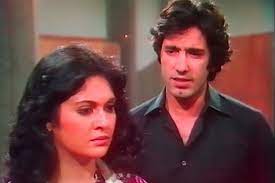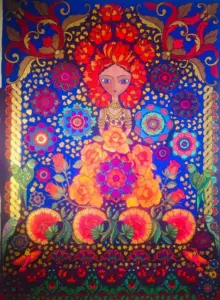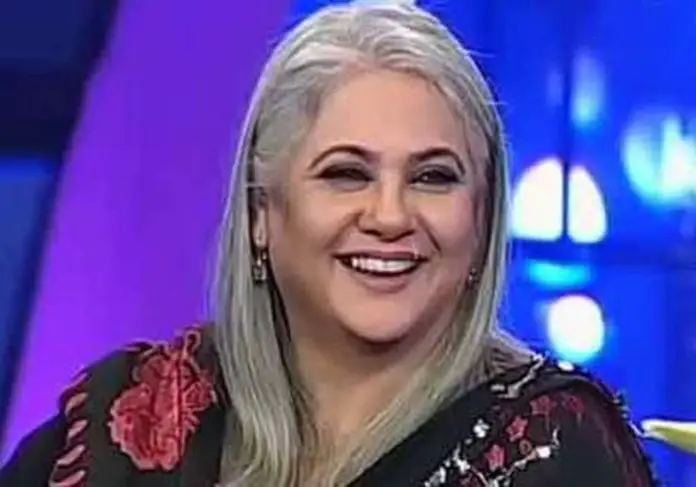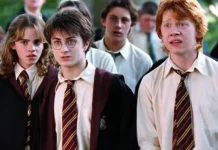In a secluded, peaceful corner of a posh locality of Lahore stands a red-bricked building. It is surrounded by various hues of green, resulting from creepers engulfing the walls and plant pots huddled together beside the main gate. Inside as well, right at the threshold of a wooden door with a Buddha carved on it, numerous clay urns welcome you to a peaceful dwelling. Here resides the Sana Muraad of Ankahi and Zara of Tanhaiyaan, two blockbuster Pakistani serials from the 1980s. Shahnaz Sheikh, as she is called, is found sitting in her lounge along-with her pets, two dogs and a parrot, with her work table spread before her. On being told that her house is extremely beautiful, the veteran actress says,
“My husband and I designed it. We put ourselves and we built the house around us, keeping under consideration our needs. It’s simple but peaceful, the latter aspect of it coming from the greenery that surrounds it. Plants, birds and animals – these are my passions.”
The conversation unfolds, and Sheikh answers all those questions, which we have been dying to ask her for years.
- Is it true that Ankahi was never your first drama serial?
Yes! My first project was a serial written by Shoaib Hashmi called Belila, the title taking its inspiration from a car of the same name.
- It is also said that your first drama serial was banned by the then existing government because it fell into the category of political satires. Would you like to share the details?
No, it was not a political satire at all, but yes, the government turned it down, for reasons still unknown. It so happened that a few episodes into the serial, Shoaib Hashmi took a house coat from Pakistan Television’s wardrobe and wore it in one of the scenes. The colours of that coat didn’t sit well with the government, which said that they signify a specific flag and the drama should not continue to run. Otherwise, there was nothing against the government, no political understatements whatsoever in the entire serial.
- Why is it that your first serial was helmed by a team from Lahore while Ankahi was a Karachi-based project?
I am basically from Lahore, and it was while I was studying at NCA that Mrs. Hashmi, who was one of my professors and always on a look-out for young talent referred me to Shoaib sahib. As far as Ankahi is concerned, I was spending a holiday in Karachi with my parents, both of whom were posted in Karachi. Haseena Moin, at that point in time, was looking for someone to play the character of Sana. Hasnaat Ahmad, a popular actor of those times had watched me perform in a play at NCA, and referred me to the team of Ankahi.
- Research says that there is another, lesser known drama serial of yours called Maray They Jin Ke Liye. Why is it that we do not know about it?
That’s because I don’t count it among my works, the reason being that it went off air without even being completed. I can’t recall why it didn’t continue after an episode or two, but somewhere in between, Maray They Jin Ke Liye just stopped screening.
- It is when one watches Ankahi and Tanhaiyaan multiple times that one starts realizing how much depth they carry, and how subtly close they are to human life. Back then, when you were working in these projects, did you have an idea about how important these dramatic works are in which you are playing an important part?
I absolutely had no idea, as I was quite young, and I don’t think someone in their early 20s looks at things from this perspective. Times were very simple and we had not started to see things in the context of socio-political frameworks yet. We weren’t even aware of the fact that Haseena Moin’s plays were feminist to the very core even back in the 80s, and that’s the beauty of Moin’s writing. It’s never in your face. Look at Tanhaiyaan, for example. The entire sensibility of the serial was woman-oriented. It’s very feel was about women, but in undertones and not loud at all. It was therefore that we would just have fun doing those projects. That’s it.

- A few months back, an Islamabad-based theatre group decided to adapt Ankahi for stage, but the project never got executed partly owing to Covid-19 and partly owing to Haseena Moin’s death who was chiseling it for the new medium. Do you believe that Ankahi, with its philosophical depth and lengthy monologues, is suitable for stage?
I don’t carry any rigid views about it. Adaptations happen all over the world, and both tragedy and comedy are part of theatre. I won’t mind Ankahi being adapted by new people in the field of dramatic art.
- How did the death of Haseena Moin, whose writings have an integral part to play in your life, affect you?
It came as a shock. Every time I met her, she was hale and hearty. Although she wasn’t keeping well regarding some of her health aspects, but she never showed it. Besides, those ailments were not of the fatal sort, the kind of which mentally prepare you for a bad news. Haseena was always happy and energetic, and that’s why her death news came as a jolt. She has left a huge vacuum, a void that cannot be refilled.
- You left acting quite early but continued to host shows. Can we say that hosting has been your real calling?
I had this very personal predilection for hosting, for I would get to meet great people. Although I wasn’t paid well, but getting to listen to phenomenal singers like Mehdi Hassan and Nayyara Noor live in shows like Meri Pasand would be an experience of its kind.
- As much clichéd the question might sound, but why exactly did you choose to leave acting?
I left because I got married. That never means that my husband had issues with my acting career. It was an entirely personal choice, as I believed that I couldn’t juggle between the two things. There are women out there who have very successfully managed their showbiz careers and matrimonial lives, but I don’t think I would have been able to do it. Seeing that showbiz work has no fixed timings, I set my priorities and chose to attend to my children.
- Did you take up teaching then?
Well, not immediately after I left acting. I started teaching a few years after that, when my children had grown a little older. Still, it’s been almost twenty five years now that I have been teaching.
- Which subject do you teach and where?
I teach Drama, starting my teaching career at Aitchison College where I taught for almost twelve years. For the last twelve or thirteen years, I have been associated with LGS in the same field – theatre.
- As a theatre instructor, do you adapt work from all over the world or is it some specific theatre that you work in?
Yes, we do stories from all over the world, but in English, as that’s the medium of our school. At times, I do incorporate an Urdu drama or two. When it comes to narratives, I am open to all kinds of them.
- A few years back, a sequel of Tanhaiyaan by the name of Tanhiayaan Naye Silsile hit the television screens, but you weren’t a part of it. Were you offered that project?
Yes, Marina, who also directed that sequel did approach me for it, but I refused for two reasons; I am a little lazy and I don’t remember lines anymore. I also don’t like making commitments and then stepping out of my comfort zone to fulfill them.
- Did you watch that sequel?
No! I don’t watch Pakistani dramas.

- Does that mean you aren’t in touch with the kind of content that is being produced by our contemporary drama industry?
I do try, at times. Actually, I can’t watch the lengthy serials we’ve started to produce. Back in our days, we had thirteen episodes maximum. Still, I try and find if there’s anything good, but very rarely.
- From the few you have watched, which ones have you come to admire?
I can’t name specific serials because I tend to skim through channels and stop where I find something attractive. It’s not that I regularly follow dramas from their beginnings to their ends, but I think HUM and ARY are doing a really good job. With so much work being done, not everything being produced can be expected to be of good quality. But the good thing is that our drama industry is running, and successfully so. It hasn’t collapsed.
- Who do you give credit to for the classics Tanhiayaan and Ankahi and many other serials from those days have become – the writers, the directors or the actors?
Firstly, we were lucky to have only one channel working. Besides, Pakistan Television’s beauty lied in its purpose being not only entertainment, but education coupled with entertainment. There was a decorum that took care of the fact that we have to educate the families out there. It is therefore that apart from dramas, we had documentaries, travelogues and single plays as well. As far as the popularity is concerned, no single person can take credit. It has to be a combination. Good scripts, if given to bad directors, fail to click. Similarly, bad writers don’t sit well with directors of good caliber. Actors too, have the tendency to make a project popular or make it a mess. Combinations just happen! There’s no thumb rule to it. That’s exactly why people do not watch all but a few dramas and films over and over again, for those dramas and films have had the best of team work involved. Even the likes of Haseena Moin had to struggle when their scripts were handed over to weak directors.
- Mention two scenes, one from Ankahi and one from Tanhaiyaan, which are very close to your heart.
I won’t mention favourite scenes, for that is not how I look at those projects, neither did I look at them from this perspective when I was working in them. The reason why these dramas came out so effortlessly is because I never termed any of my scenes as favourite or unlikeable. But yes, there are some difficult scenes which I would like to mention, for I haven’t been able to forget them for the technicalities that came to be involved in their making. One such scene is the accident scene from Tanhaiyaan. To be honest, if a fire were to break out in Karachi at that point in time, no one would have been able to reach and put it out because the entire city’s fire brigades were there on the sets, throwing their water-tanks to produce the heavy rain for that scene. So you can imagine for yourself now how much effort went into the making of that serial. Plus, no one else but a government channel could have done that, considering the number of fire brigades we had on the sets, pouring tanks full of water to make the best out of that scene of Tanhaiyaan.
- So the rain in that popular accident scene from Tanhaiyaan was never real?
No at all!
- And which technical scene from Ankahi made you face similar difficulties?
The outdoor scenes, I must say. It was so difficult doing the car scenes back at that point in time, with all the crew fixed in one single vehicle. You were also required not to lose patience despite the suffocation it resulted in.
- Is there any such drama serial which you were offered back then but you rejected, and later on regretted seeing its popularity?
I have no regrets, for none of them grew as popular as Ankahi or Tanhaiyaan (laughs).
- Did Sahira Kazmi, the lady behind Dhoop Kinare ever approach you for some project?
Yes, she did. She offered me a long play, which I unwillingly refused. There was some issue I was dealing with, owing to which I had to turn down the offer. Still, Sahira and I are very good friends.
- You said that you left acting for your family. Now that your children are grown up and settled, do you have any plans to make a comeback?
If something good comes along, I will definitely do it, but for the simple sake of having fun. In the age bracket I am in, I have nothing to prove.
- Is there any specific director you’d like to work with?
I would love to work with Sarmad Khoosat, who I believe is one of our finest directors with an in-depth knowledge of the craft of drama making.
- How do you spend your time?
I work. As I told earlier, I teach. By the time I come home from school, it’s 3 o’ clock. After that, I go out on errands to do important household chores. Otherwise, I paint. These days, however, I am going through a mind-block. I also used to read a lot, but with the emergence of stuff like Netflix, my reading habit has somewhat lessened. However, I do love to listen to audiobooks while I am painting.








